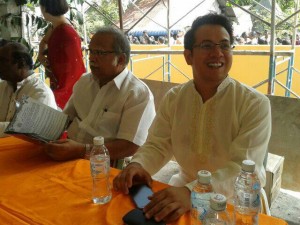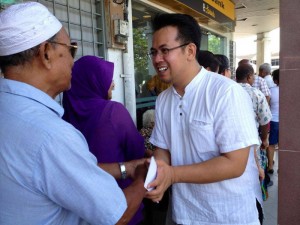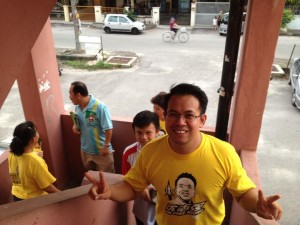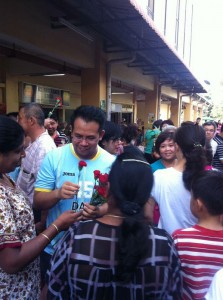Name: Steven Sim Chee Keong
Age: 31
Educational background : Bachelor of Computer Science, Universiti Malaya; completed the “Insights into Politics and Policy in Asia for Global Leaders” programme at Lee Kuan Yew School of Public Policy, National University of Singapore
Previous experiences: former Executive Secretary of the Network of Social Democracy Asia (SocDem Asia); former local government councillor, Majlis Perbandaran Seberang Perai (MPSP); Senior Executive Officer of Penang Institute; Young Global Leader, Geneva-based World Economic Forum, alongside Nurul Izzah Anwar; involved in the preparation of 10-year development plan Penang Paradigm
Publications: The Audacity of Hope, 2012; various articles at Penang Monthly, Malaysiakini, the Malaysian Insider.
________________________________________________________________________________________
How have you become who you are today?
If we were to talk about my political inclination, among my earliest memories of politics is when I was 16 years old, going 17. That was around 1999. It has nothing to do with [MP for Kluang, Liew] Chin Tong’s ‘generasi reformasi’, though. But [the period is] close enough. I still remember, at that time, I told my parents off because they voted for DAP.
Why?
I am a product of ‘Mahathirism’. During that time, we didn’t have alternatives. Only BN was the government that can provide for us. I grew up in a Mahathir education system, or what we can call as the Mahathir hegemony. From the moment you wake up in the morning, until you doze off listening to Negaraku playing on the television at night, we were bombarded with the propaganda that only BN is fit to be the government.
My parents supported the opposition. When I was 17, at the height of the country’s political activism in my country, I scolded my parents, especially my mother. I said, ‘why support Lim Kit Siang? The opposition only knows to make noise. We have to support BN, BN has given us everything.’ That was my political stand back then. That is my earliest political memory.
Yes, I know, it’s horrible.
How about your university days?

Steven Sim with Penang Deputy Chief Minister II, Prof P Ramasamy, at an officiating ceremony of Sri Mariamman temple at Alma, Bukit Mertajam, 29 May.
When I was in my second year pursuing my studies at Universiti Malaya, I was invited by a lecturer to take part in campus elections. The weird part about it was that I needed to be invited by a lecturer [to contest], instead of it coming from my own will.
But perhaps my lecturer for critical thinking and public speaking was desperate to find a candidate at that time; and suddenly when he found out that I could speak in class, he immediately invited me to take part in campus elections.
I knew nothing about what is pro-Aspirasi and pro-M, back then. And when you’re naïve in politics, you’ll tend to be on the wrong side. So I contested as an Aspirasi candidate. That year, Aspirasi lost; but I won. So I became the opposition in the Student Leadership Council.
It was a good experience since I followed [politics] not as a partisan. As I was not a partisan, I got involved [with student politics] since I thought it was a good platform for me to serve. I went on minding my own business. However I was seen as an important part of the Student Leadership Council itself, to the extent that somebody has accused me of being a spy for pro-M in the Aspirasi bloc; despite me not knowing what is Aspirasi, and what is pro-M. Nevertheless it was a successful experience in building political realisation. I was exposed to national politics because of that experience.
What about other interesting experiences?
My third experience in political enlightenment happened perhaps during the year 2006. When I was returning home to Penang from Kuala Lumpur, and after I spend my time building my career, and myself, I returned to join politics and social service. I made a decision to be involved in a political movement, so I went to the Gerakan headquarters.
Unfortunately (or not), the office was closed, since it was a weekend. Fate has it that my friends and I bumped into an annoying person there, who told us off since we visited the office on a weekend. ‘Why didn’t you guys come during office hours?’ the person said. Due to that reaction, I lost my interest there and then.
At that time, we saw Gerakan as the ‘opposition within the government’, a party of intellectuals, BN’s voice of heart and the Penang state government. [So] I was really disappointed with the reception given.
Back in university I was also more exposed to DAP politics. My housemate, David Pek, was a fan and supporter of the DAP. I still recall him subscribing to The Rocket using a pseudonym. If I was not mistaken, he used the name ‘Charles Santiago’. So we were very exposed to information regarding the DAP. I also attended many DAP-held forums.
After my failed attempt in joining Gerakan, in 2007 I felt like I should try joining the DAP. I wrote a letter via the DAP website. After awhile, Chong Eng replied me, asking whether I was interested to meet her. I was shocked, and [also] a bit nervous.
And so we met. I remember meeting Chong Eng at a coffee shop; and that was the first time I met an elected representative. I was a bit ashamed at that time, since I was driving an old, worn out Iswara. But then I saw Chong Eng’s car being worse off than mine. That made me think about the DAP and its leaders. Ever since then, I volunteered with Chong Eng to help at her service centre. It began with IT matters; I helped her set a blog. And I think Chong Eng was among the earliest ones to have a Twitter account, during March 2007, time when nobody was to care about Twitter. From there I realized that there is indeed a difference between the DAP, opposition and UMNO-BN. [I realized that] through the aspects of values supported by people like Chong Eng.
I joined the DAP in 2007.
So from disliking Lim Kit Siang, you went on to become a DAP member?
My mother was extremely cynical when I told her I joined the DAP. She said, once I was mad at them since they voted for the DAP, now I wanted to join the DAP instead. From a hater of Lim Kit Siang, I became an ‘idoliser’ of Lim Kit Siang.
If you ask me what is molding me today, I will say that it is the three, or four political milestones in my life journey that have shaped and brought me to where I am today.
Now that you are in the DAP after your long experience in political enlightenment, do you think that the DAP is a good vehicle for the young to be active in political activism?

Steven Sim greeting old folks lining up outside a bank to receive the annual gift from the Penang state government for the elderly, 18 May.
I joined the DAP in 2007, only months before the general elections of 2008. I was still green, a rookie who didn’t know anything about political campaigning, but I was invited to talk in series of ceramah. Of course [I] messed up, then. In one ceramah in 2008, I recall saying that after knowing Chong Eng and having that awareness about opposition politics, I realised that the DAP has been my first choice all along.
I felt at that time, at the age of 25, being part of the younger generation, we were all frustrated and fed up with the immorality shown by the government and in politics. DAP stoods out as an obvious choice. DAP was the only party which has not compromised itself with UMNO and its leaders have shown themselves to be of high integrity, fighting for the cause of justice almost without any returns up til 2008 (when they won).
Young people like us are very angry with the atrocities in politics. Many young people are very cynical, they think politicians are all the same – corrupted, making false promises.
But I would like to encourage them to look into the struggle that the party and history that DAP has gone through… this is what attracted me to the party in the first place. As a young man looking for a conscientious platform, DAP presented that stand.
Do you think the people are very hyped about politics?
Now more than ever. In 1998, Malaysia had the first wave of uprising of young people in recent years. And then again in 2008, the second wave. In the 2013 general election, we saw many young people, many of whom had previously been very indifferent towards politics – this time, they stood up.
We’ve seen people spend their own money to come back from overseas to vote, we’ve seen people who volunteer to assist in political campaigns, forming their own “volunteer squads” on election day, for instance. There is a huge surge of political awareness among young people in Malaysia.
I think this took place because they finally felt that it is important for them to take part in. It is not that they did not love the nation before this. Previously, they felt that it was useless, even if they take part there would not be a point. But this time, they realise that their participation can make a difference.
Many young people are also joining the party. So many young people want to take part because they can see that it makes a difference. I think that is important.
And you wrote about this?
My book has two objectives. Number one, to put down into words my own journey of political thinking and meditation so that in the years to come, we can look back and reexamine ourselves to see whether we have been truthful to the path that we have taken.
The second objective is, I want to invite people of my generation and readers in general to join me to do what I call political thinking. I felt that a lot of times in Malaysia, the political rhetoric is very superficial, a lot of it centers around race and religion. I want to invite readers to think a bit further, to do a bit of social analysis about why things happen the way they happen.
It’s light reading, I want to invite as many people as possible to engage with me, not necessarily to agree with me, but to engage with me. That’s the purpose of social analysis – to engage one another, look beyond the superficial, look at why things become what they are today.
In the last election, BM has made a name for herself in its own special way. We won by the second highest majority in the country. The people of BM have said it loud and clear, they boldly say it with courage that they want a clean government, they want a government that is good and fair.
When I went back to KL they asked me, what place is Bukit Mertajam? If we are a kampung, we are a courageous kampung.
As an elected representative, my role is to fulfil the aspirations of the people of BM. They want a clean, fair and good government. It is unfortunate that we still cannot take Putrajaya due to the dirty tactics. But I can assure this, I will not let UMNO and Najib have a good time in parliament.
Because the mandate given by my voters is very clear. They want a clean government. Before we can be that for them, we will make sure UMNO and BN will not have a field day. Of course in our aspiration we hope for ‘ubah’, the high spirits has not ceased. Malaysians are still very eager to change and we will be part of that movement.






